Lidl
 |
|
| Type | German multi-national |
|---|---|
| Industry | Retail (Grocery) |
| Founded | 1930s |
| Headquarters | Neckarsulm, Germany |
| Key people | Dieter Schwarz: Chairman and CEO Gunter Schwarz: CEO Michael Dönherp: CFO |
| Products | Mainly own brand, with a few larger and regional brands |
| Revenue | € 59 billion (2008)[1] |
| Website | www.lidl-info.com |
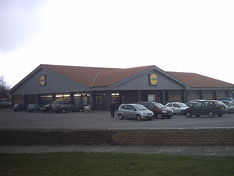
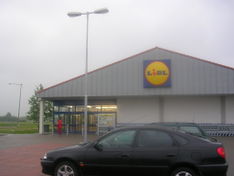
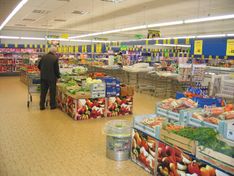
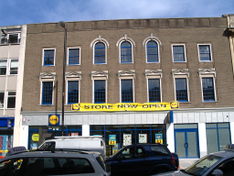
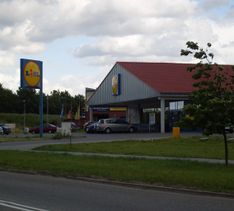
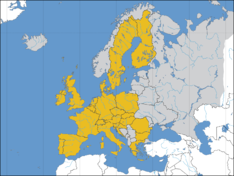
Lidl (generally pronounced /ˈlɪdəl/ LI-dəl in English-speaking countries and pronounced /ˈliːdəl/ LEE-dəl in its country of origin) is a German discount supermarket chain that operates about 8,000 stores worldwide. The company's full name is Lidl Stiftung & Co. KG. It belongs to the holding company Schwarz, which also owns the store chains Handelshof and Kaufland. Lidl is the chief competitor of the similar German discount chain Aldi.
Founded in the 1930s by a member of the Schwarz family (and called at the time Schwarz Lebensmittel-Sortimentsgroßhandlung), Lidl has – since the opening in 1973 of the first of its stores in their present incarnation – now established itself in over 20 countries worldwide.
In 1930, Josef Schwarz became a partner in Südfrüchte Großhandel Lidl & Co., a fruit wholesaler, and he developed the company into a general food wholesaler. In 1977, under his son Dieter Schwarz, the Schwarz-Gruppe began to focus on discount markets, larger supermarkets, and cash and carry wholesale markets. The first Lidl discount store was opened in 1973, copying the Aldi concept. By the year 1977, the Lidl chain comprised 33 discount stores.
Contents |
Store layout
Most Lidl stores follow the same basic layout flow with tins and carbonated drinks in the first aisle and alcohol in the last. The chiller always runs along the back wall of the store, with chilled convenience foods such as sandwiches, pasta salads and fruit in the first chiller bay. Older stores did not have aisle breaks (gaps in between the shelving) that ensured customers followed the flow of the store. This practice has been largely reduced with older stores being re-merchandised to accommodate these breaks. Fruit and vegetables are normally in the first aisle of the store, as are bread and cakes. The UK stores, however are currently undergoing a major remerchandising programme. This is to bring all stores upto date and to follow the same merchandising policies. The major change to the store layout is that the carbonated drinks and fruit juices are relocated to the centre of the store with the non-food (specially listed lines) items in this area moving to the back. This creates a more even layout of the store and creates a more "open" feel. The increase in the amount of food specials (specail offer non-permentant lines) offered has resulted in an increased specific area for these products being located above frozen cabinets and high lighted with bright orange day-glo signage.
Other Services
In late October 2009 Lidl UK launched a DVD rental service 'Lidl Movies'[2], undercutting Tesco DVD rental which had previously been the UK's cheapest online DVD rental service.
The service is powered by OutNow DVD rental which has previously been criticised for its poor customer service.[3]
Criticism of Lidl's treatment of its staff
Trade unions in Germany and other countries have repeatedly criticised Lidl for mistreatment of workers, breach of European directives on working time and other abuses. These have been published in the "Black Book on the Schwarz Retail Company" published in Germany and now available in English.[4] Whilst The Times notes that Lidl managers work excessive hours, being obliged to sign out of the working time directive when starting with the company, both The Guardian[5] and The Times[6] in the UK amongst other allegations have reported that Lidl spies on its workforce with cameras, makes extensive notes on employee behaviour, particularly focusing on attempting to sack female workers who might become pregnant and also forces staff at warehouses to do "piece-rate" work. Lidl management denied the charges. In Italy, in 2003, a judge in Savona sentenced Lidl for anti-union policies, a crime in that country.[7]
In March 2008 the German news magazine "Stern" released a cover story reporting systematic surveillance of Lidl workers, including most intimate details of their private affairs.[8][9][10]
Lidl's treatment of employees has further been illustrated by a former employee who has dedicated a website to show stories of past and present employees.[2][11]
Lidl has also come under criticism in the United Kingdom & Ireland for not allowing workers to join Unions.
Countries with Lidl branches
Current
| Country | Number of Stores |
|---|---|
| 180 [12] | |
| 300 (approx) | |
| 60 [13] | |
| 216 | |
| 52 | |
| 130 | |
| 1350 | |
| 3004 | |
| 200 | |
| 116 | |
| 106 | |
| 510 | |
| 1 | |
| 12 (5 opened 7 more to open by end of 2010 including 2 stores in Gozo) | |
| 400 | |
| Sold to Reitangruppen—now REMA 1000 stores. | |
| 350 [14] | |
| 210 | |
| Retail only | |
| 30 | |
| 50 [15] | |
| 500 | |
| 151 | |
| 13 | |
| 500 (approx) |
Planned
| Country | Opening | Notes |
|---|---|---|
| 2012 | ||
| 2011 | ||
| 2015 |
Competitors
| Store | Stores | Country |
|---|---|---|
| Aldi | 8,210 | Europe, USA, Australia |
| Netto | 1,000 | Europe |
| Biedronka | 1,500 | Poland |
| Netto Marken-Discount | 4,000 | Germany |
| Penny Market[17] | 5,000 | Europe |
| Norma | >1,300 | Germany, Austria, France, Czech Republic |
| Dia, in Portugal Minipreço, in France Ed's | 2,566 | Spain, Portugal, Greece, Turkey, Argentina, Brazil, France |
| Hofer (Aldi), Eurospin | Slovenia | |
| Denner | Switzerland | |
| Maxima | 430 | Lithuania, Latvia, Estonia, Bulgaria |
| Farmfoods | 300 | United Kingdom |
References
- ↑ "Aldi abgehängt?". SPIEGEL Online. 2006-01-16. http://www.spiegel.de/wirtschaft/0,1518,460199,00.html. Retrieved 2006-01-17. (German)
- ↑ http://www.which.co.uk/news/2009/10/lidl-supermarket-starts-cheap-dvd-rental-service-187138.jsp
- ↑ http://www.choosedvdrental.co.uk/dvd-rental-review/lidl-movies.asp
- ↑ "Black Book on Lidl in English" (pdf). http://lidl.verdi.de/schwarz-buch/schwarz-buch_uebersetzt/data/Order%20Black%20Book%20Lidl.
- ↑ Pidd, H. (2007), Cheap but not so cheerful, The Guardian, 14th March, 2007
- ↑ Boyes, R. (2008) Lidl the big brother supermarket is watching you, The Times, 27 March 2008
- ↑ "Il tribunale di Savona condanna Lidl Italia per comportamento antisindacale". Il Magazine. 9 July 2003. http://www.filcams.cgil.it/stampa.nsf/97b04b26541301cbc125690a005317a6/33cd7b2012094337c1256d5e004dfdde!OpenDocument. (Italian)
- ↑ stern.de - Überwachungsskandal bei Lidl (video) (German)
- ↑ stern.de - Entsetzen über Lidls Stasi-Methoden (German)
- ↑ stern.de - Zitate aus den Lidl-Protokollen (German)
- ↑ http://franklludwig.com/lidl.html
- ↑ "Lidl Austria Company Profile". http://www.lidl.at/cps/rde/xchg/lidl_at/hs.xsl/6544.htm. Retrieved 2009-10-27.
- ↑ "Lidl Online Croatia Store List". http://www.lidl.hr/cps/rde/xchg/SID-FA71EF62-C1348625/lidl_hr/hs.xsl/5941.htm. Retrieved 2010-06-16.
- ↑ "Lidl Polska Online". http://www.lidl.pl.
- ↑ "Lidl Online Slovenia Store List". http://www.lidl.si/slo/home.nsf/pages/c.service.s.nst.o.Kranj2. Retrieved 2009-06-03.
- ↑ "Lidl will zu Aldi aufschließen". RP Online. http://www.rp-online.de/public/article/wirtschaft/news/576544/Lidl-will-zu-Aldi-aufschliessen.html. Retrieved 2008-06-30. (German)
- ↑ [1]
External links
- Official homepage (includes links to national sites)
- Yahoo! — Lidl & Schwarz Stiftung & Co. KG Company Profile
- Current stores number (German)
- Silvercrest - LIDL brand electronic product
|
|||||||||||||||||
|
||||||||||||||||||||||||||||
|
|||||
|
|||||||||||||||||||||||||||||